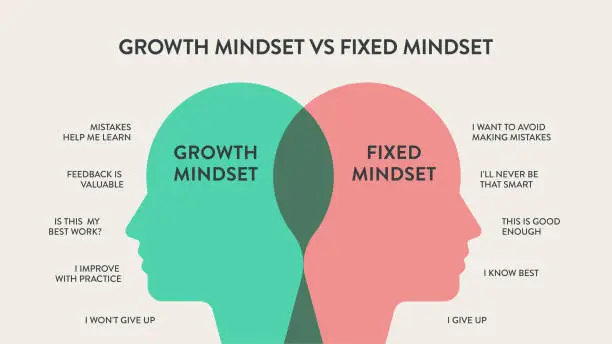
The Growth Mindset: Transforming Your Habits for a Productive Life
- 0
Table of Contents
ToggleIntroduction
To have a good and productive life right now, it largely depends on our way of thinking. The Growth Mindset is a notable tool in the field of psychology. Carol Dweck coined the mindset which inspires people to think that hard work and commitment can make them better and smarter.
A growth mindset is different from a fixed mindset because instead of accepting talents are always the same, it promotes learning more, self-improvement and achievement in all aspects of life.
What Is Behind the Success of the Growth Mindset?

Many studies in psychology have shown that the Growth Mindset works. In her research at Stanford, she saw that those who consider intelligence to be flexible often do well in various areas of life.
As a result, individuals react differently to failures, view work as more significant and approach challenges in their lives. Instead of ignoring problems, they use them to get better. Changing the way we think increases our resilience, something vital for a healthy mind and steady achievements in a challenging society.
How Beliefs Shape People’s Habits
The way we think and believe shapes our habits. If someone uses The Growth Mindset, they will probably start doing things like setting goals, writing daily in a journal and organizing their time. These things take time to build, but if you believe in making yourself better, you can achieve them.
A person who is flexible in their thinking keeps trying new approaches, but someone who is set in their ways may choose to stop and conclude that they are just unorganized.
How Challenges Help in Development and Changes
Facing challenges is an opportunity for people with a growth mindset. If we accept difficulties, we become stronger at solving problems and more creative. Sometimes, a software developer runs into difficulties solving a challenging coding problem. Still, assuming they can get better and improve, they continue trying and ultimately achieve their goals. Doing this encourages us to keep going, no matter the challenges.
Building Useful Habits with the Help of the Growth Mindset
To change your life, try to link your daily habits to The Growth Mindset. At the start, keep track of your goals, review your progress and appreciate every little achievement. Instead of criticizing yourself, say positive messages to yourself.
You can also say “I can’t do this yet” instead of “I can’t do this.” A slight move can boost people’s faith in their future capabilities. When you hold on to these habits long-term, you achieve a higher level of productivity. Studies have proved that working on a task every day can improve concentration and motivation.
Science Explains the Benefits of Adopting a Growth Mindset
Brain research conducted recently proves that The Growth Mindset is right because neurons can change in response to new experiences. As people learn new skills, Harvard research suggests that their brains make new connections.
In other words, intelligence and skills can change and develop over time. As an example, when someone learns a new language or practices an instrument, their brain changes over the months or years. It agrees completely with what growth mindset centers on: when you try, continue and follow strategies, your abilities can improve.
Developing a Growth Mindset in Your Work and Career

The Growth Mindset encourages people in professional jobs to think creatively, adapt and lead. Workers with a growth mindset treat all feedback as something beneficial. According to Gallup, companies that focus on growth achieve profits that are 29% higher on average. Those with this approach inspire their team members to improve and share knowledge.
Google and similar companies focus on encouraging employees to learn more by giving them the chance to develop their skills. As a result, individual abilities go up which also benefits the group as a whole by increasing productivity and mood.
Working on the Growth Mindset Every Day
The Growth Mindset should be practiced and cultivated every single day. Start by considering your failures and trying to understand what you can learn from them. Hang out with individuals who help you improve and introduce new ideas.
Be mindful so you can notice thoughts from a fixed mindset and after that make an effort to change those thoughts. Take time to write down your progress in a journal. Continuously active mindfulness helps convince you that you can get better, turning your day-to-day tasks into opportunities for improvement.
Promoting the Growth Mindset to People
Spreading the belief in a Growth Mindset can lead to exciting changes. The views others have on effort and failure are greatly affected by parents, teachers and leaders. Define your praise by saying, “You put a lot of effort into this,” rather than congratulating them by saying, “You are intelligent.”
Better student achievements are achieved in schools using growth-based curriculums. Evidence from Education Week indicates that teaching growth thinking to students encourages them, resulting in stronger performance and advanced grades.
Conclusion
Growth Mindset is meaningful because it supports forming good habits and lasting achievements. Reshaping how individuals think about failure, trying and education helps them bring out their real abilities. Taking on this state of mind encourages a person to keep improving and remain resilient in their life or job.
According to Carol Dweck, the process of becoming is preferable to having achieved something already. By working at it and sticking with it, every person can change from a restricted lifestyle to a better future.